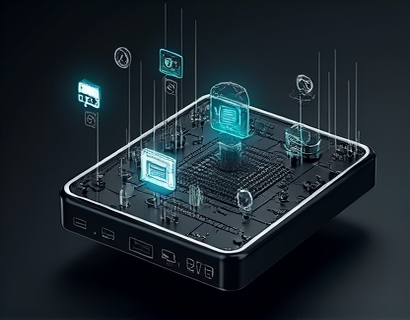AI-Driven Healthcare: Revolutionizing Patient Care with Instant Expert Insights and Personalized Medical Support
The integration of artificial intelligence in healthcare has ushered in a new era of patient care, offering unprecedented access to instant expert insights and personalized medical support online. This transformation is not just about technology; it's about empowering individuals to take control of their health with confidence and precision. AI-driven platforms are at the forefront of this revolution, providing a robust solution to the complex and evolving needs of modern healthcare.
Understanding AI in Healthcare
Artificial intelligence in healthcare, often referred to as healthtech, encompasses a broad range of applications designed to improve patient outcomes, streamline clinical workflows, and reduce costs. AI algorithms can analyze vast amounts of medical data quickly, identifying patterns and insights that might be missed by human eyes. This capability is particularly valuable in areas such as diagnostics, treatment planning, and patient monitoring.
One of the most significant advantages of AI in healthcare is its ability to provide personalized medical advice. By leveraging machine learning models trained on extensive datasets, these platforms can offer tailored recommendations based on an individual's unique health profile, medical history, and current symptoms. This level of personalization is crucial for effective healthcare, as it ensures that the advice and support provided are relevant and actionable.
Instant Access to Expert Insights
Traditional healthcare models often involve delays in accessing expert advice, which can be critical in time-sensitive situations. AI-driven platforms change this paradigm by offering instant access to expert insights. When a user inputs their symptoms or health concerns, the AI engine rapidly processes this information against a vast database of medical knowledge, generating a response that mimics the advice a healthcare professional would provide.
These platforms use natural language processing (NLP) to understand and interpret user queries accurately. The AI can then cross-reference the input with clinical guidelines, research papers, and real-time data to generate a comprehensive and accurate response. This immediate access to expert-level information empowers users to make informed decisions about their health, potentially leading to earlier interventions and better outcomes.
Personalized Medical Support
Personalization is a cornerstone of AI-driven healthcare. Each user's health journey is unique, and a one-size-fits-all approach is often inadequate. AI platforms use advanced algorithms to create personalized health profiles for users, taking into account their medical history, lifestyle, genetic factors, and real-time health data.
For instance, a user with chronic conditions like diabetes or hypertension can receive tailored advice on diet, exercise, and medication management. The AI can monitor the user's progress, adjust recommendations based on new data, and alert healthcare providers if necessary. This continuous loop of personalized support ensures that users receive the most relevant and effective guidance at every stage of their health journey.
Enhancing Patient Engagement
AI-driven healthcare platforms are not just about providing information; they are designed to enhance patient engagement and empowerment. By offering interactive tools and educational resources, these platforms help users better understand their health conditions and the choices available to them. This increased knowledge leads to more active participation in their care, which is a key factor in improving health outcomes.
For example, patients can use virtual assistants to track their symptoms, set reminders for medication, and receive motivational messages to stick to their treatment plans. The AI can also provide educational content tailored to the user's specific needs, helping them make informed decisions and feel more in control of their health.
Improving Access to Healthcare
One of the most transformative aspects of AI-driven healthcare is its potential to improve access to medical support, especially in underserved areas. Geographic barriers and limited healthcare resources can significantly impact the quality of care individuals receive. AI platforms bridge this gap by providing remote access to expert advice and medical information.
Users in rural or remote locations can receive the same level of support as those in urban areas, ensuring that everyone has equal access to high-quality healthcare. This democratization of medical knowledge helps reduce health disparities and promotes a more equitable healthcare system.
Integration with Wearable Devices and IoT
The integration of AI-driven healthcare platforms with wearable devices and the Internet of Things (IoT) further enhances their capabilities. Wearables can continuously monitor vital signs and other health metrics, sending real-time data to the AI system. This constant stream of information allows the AI to provide more accurate and timely insights, enabling proactive health management.
For instance, a user wearing a smartwatch that tracks heart rate and activity levels can receive alerts and recommendations based on their current health status. If the AI detects an abnormal pattern, it can suggest immediate actions or prompt the user to seek professional advice. This seamless integration of technology into daily life makes healthcare more convenient and effective.
Challenges and Considerations
While the benefits of AI-driven healthcare are significant, there are also challenges and considerations that must be addressed. Data privacy and security are paramount, as sensitive health information is involved. Platforms must adhere to strict data protection standards and implement robust security measures to safeguard user data.
Additionally, the accuracy and reliability of AI algorithms are critical. Continuous validation and updating of these algorithms are necessary to ensure they provide accurate and safe advice. Collaboration between AI developers, healthcare professionals, and regulatory bodies is essential to establish best practices and guidelines.
Future Prospects
The future of AI-driven healthcare is promising, with ongoing advancements expected to further enhance patient care. As AI technologies continue to evolve, we can anticipate more sophisticated and intuitive platforms that offer even more personalized and proactive support. The integration of AI with other emerging technologies, such as blockchain for secure data sharing and quantum computing for faster data processing, will open new possibilities in healthcare.
Moreover, the increasing adoption of AI in healthcare is likely to lead to new business models and services, further transforming the industry. The focus will remain on improving patient outcomes, reducing costs, and making healthcare more accessible and efficient.
Conclusion
AI-driven healthcare represents a significant leap forward in patient care, offering instant expert insights and personalized medical support at the fingertips of users worldwide. By leveraging advanced technology, these platforms empower individuals to make informed health decisions, leading to enhanced well-being and better health outcomes. As the healthcare landscape continues to evolve, AI will play an increasingly vital role in shaping the future of medicine, ensuring that healthcare is not only more effective but also more accessible to all.










































